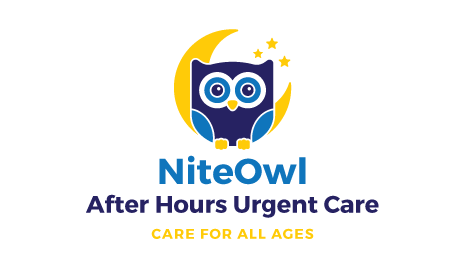Pediatric Urgent Care Chattanooga
Ear, Nose and Throat Infections a Fall and Winter Thing?
Now that we are entering the colder months of the year, many people are anticipating the onset of illness or infection, but it is a popular misconception that cold weather causes us to get sick, as anyone suffering through a summer cold can attest. The presence of bacteria, rather than the falling temperature, cause Ear, Nose, and Throat Infections, also known as ENT Disorders.
Yes, colder air can cause severe irritation and cold temperatures can cause a runny nose as a reaction to the dryness of the air. Breathing through the nose, rather than the mouth, can reduce some of the symptoms of a sore throat. When the weather takes a dive, the body experiences decreased blood circulation, which can in turn cause ear pain; this is why we wear hats or ear muffs to provide warmth and add protection from exposure to chilly wind.
Types of Ear, Nose and Throat Infections
Ear Infections
The usual culprits triggering ear infections are upper respiratory viral infections like a cold or the flu, but allergies to things like pollen or dust, smoke, fumes, or toxins from the surrounding environment can also aggravate the respiratory system and cause inflammation that can become a viral infection, manifesting as fever. Your child may complain of a sharp or dull continuous pain in the ear, muffled hearing, drainage of fluid, diminished appetite, fever, and tugging at the ear. Recurrent acute ear infections are generally attributed to the buildup of fluid in the middle ear that provides the ideal conditions for germs to grow. Allergy testing can identify possible allergens causing symptoms that never quite completely go away.
Strep Throat
If a child experiences a sore throat without a runny nose or a cough, they may be suffering from Strep, aka Group A Streptococcus, a bacterial infection we treat by prescribing antibiotics. The infection can clear up on its own, but untreated strep can threaten to infect other parts of the body in a condition known as rheumatic fever. Your PM Pediatric provider uses a lab test called a “throat culture” to determine what kind of germs are making your child sick. A cotton swab quickly and gently applied to the tonsils collects the germs for careful testing. The same test can also identify conditions such as Pneumonia, Meningitis, Diptheria, rheumatic fever, or other infections. Once the provider knows whether it is strep causing the symptoms, the proper antibiotic can be prescribed. It is very important to only use antibiotics when needed to treat bacterial infections because the bacteria can adapt to medications, becoming “superbugs” and making the drugs less effective. Antibiotics do not cure colds, the flu, or simple sore throats caused by viruses.
Sinus Infections
The dreaded sinus infection is characterized by feeling nasal congestion and lingering pain under the eyes from inflammation within the lining of the nose and chambers connected to it. Cold symptoms can mirror sinus infection symptoms, so it is important to get tested. In some cases, a referral to an Ear, Nose and Throat Specialist may be needed to address underlying issues.
Respiratory Syncytial Virus (RSV)
RSV is an infection of the lungs and respiratory tract. Symptoms are usually mild and, again, can mimic the common cold. Severe infection can happen for infants and adults with heart or lung disease.
Mono
Mononucleosis is commonly thought of as a “kissing disease” since it is transmitted through saliva and primarily happens with adolescents or young adults, but you can get it from someone coughing or sneezing nearby or by sharing a glass or utensils. Mono isn’t as contagious as other infections, including colds. Rest and fluids are key to treatment.
Treating the Symptoms of Ear, Nose and Throat Infections at Home
Pain relievers sold over-the-counter cab bring down fever and help with that achy feeling that accompanies the “bug” that’s going around. A saline spray can relieve congestion by loosening mucus, while a decongestant can also treat mild symptoms. A cough suppressant can help to numb and soothe a sore throat. As a natural remedy, try eating ice chips to stay hydrated and reduce throat soreness.
Reduce Your Likelihood of Getting Sick in the First Place
While you can’t completely isolate your child from germs that may lead to infection, you should teach them to avoid physical contact with fellow students or family members, wash hands often with soap and water, avoid shaking hands, and sneeze or cough into the elbow rather than the palms of the hands. Viruses can live for hours on hard objects such as countertops, crib rails, and toys. Touch your mouth, nose or eyes after touching a contaminated object and you're likely to pick up a virus. Viruses may have an incubation period of days or weeks, meaning there could be some time passing between when the infection starts and symptoms start to appear. Eating healthy keeps the immune system working better. Avoiding caffeine products and alcoholic beverages also helps the body stay hydrated. Perhaps most importantly, get sufficient rest so the body can function at peak performance.
What to Do When Your Child Feels Bad
NiteOwl Pediatrics offers treatment for Ear, Nose and Throat Infections, including Lab Services for testing patients for the flu, Strep, REV, and Mono. You should seek medical attention immediately if you suspect that your child has one of these serious infections.
If you or your child have been sick for several days and aren’t feeling better – or getting worse – a bacterial infection is likely to blame. You should contact your doctor or visit one of our providers at NiteOwl Pediatrics to determine if antibiotics are needed.
Note: The information in this blog is intended for general informational purposes only and does not address individual circumstances. It is not a substitute for professional medical advice, diagnosis or treatment and should not be relied on to make decisions about your health. Never ignore the professional medical advice in seeking treatment because of something you have read on a website. If you think you may have a medical emergency, immediately call your doctor or dial 911.
Photo: © Jarun Ontakrai | 123RF Stock Photo Blog © 2018 NiteOwl Pediatrics Chattanooga TN

